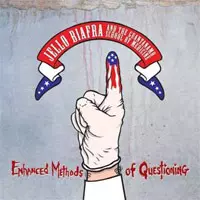Jello Biafra is a hard guy to pin down. For all his spoken word, thickly worded records, and willingness to utilize press, his persona is as much clouded by his information dispersal as it is defined. Fascinatingly, on Jello Biafra and the Guantanamo School of Medicine's second release, Enhanced Methods of Questioning, Biafra reveals himself through the works of other artists.
Enhanced Methods of Questioning picks up where the group's debut LP left off. Biafra howls at conservatives, yuppies, and corrupt government officials while the band supports his unique tone with muscular, fast-paced hardcore riffs that at times, approach a thrash metal cadence. Much like Biafra's second record with the Melvins, on this release, because the band defined themselves with their first release, they allow themselves a little more rein to get freakier.
On "The Cells That Would Not Die", Biafra comments on how the pharmaceutical industry is careless with its experiments and tends to abuse the rights of its patients. Supported by a refrain that feels like it was snatched from a B movie, the tune comes off in tone almost as a political Misfits tune with injected humor. Sonically, the group gets daring on "Miracle Penis Highway", where a funk riff blends with Detroit protopunk to create an interesting mash-up of two disparate styles in a surprisingly fitting pair.
While many punk artists get mellower with age, Biafra has grown even more agitated. "Dot Com Monte Carlo" focuses on gentrification in San Francisco and shows that, if anything, Biafra is holding onto his values with even more grip than before. He asks, "Where are the gangs in the mission when you need them / how about some yuppie drive-bys for a change?" and follows up with "Wanna chase those twits down the street with a chain saw!" While it's clear that Biafra feels that the cultural aspects of SF are being stripped away in lieu of generic and discriminatory "niceties," it's not clear as to how literal he intends his lyrics to be taken. Is he actually hoping for yuppies to be killed in drive-by shootings or is he just opining that those pushing the poor into the streets might be a little more caring if they knew the situations that they were creating? If it is the former (and I'm not saying that it is; I sure don't know), then what separates Biafra from fundamentalists who wish death upon "sinners"?
The release's masterpiece, and one of Biafra's very best works to date, comes in the 18-minute "Metamorphosis Exploration on Deviation Street Jam". Something of a mixture of two separate covers originally done by pre-punk weirdoes the Deviants, and Biafra's own lyrics, the winding tune is one of the first times we hear what Biafra thinks about himself, as opposed to what he thinks about other things. Because Biafra is so clever and has such an extensive reservoir of insightful comments, he often feels the need to cramasmanywordsaspossibleintohissongs. But here, he pulls back a little and lets his words hang as he describes how he became interested in rock music and the thing down inside of him that makes Biafra be Biafra. Somewhat echoing the scene in Apocalypse Now where Corman and Lucas play Colonel Kurtz's disturbing tapes to Willard before assigning him his mission, the vocals are somewhat distorted and distanced from the music, giving Biafra's soliloquy a fevered but unprotected and vulnerable sentiment.
Now that the Guantanamo School of Medicine has defined itself and become more comfortable with getting weird, they're creating their most daring work that snaps together surprisingly well. As Biafra gets deeper and deeper into his origins and gives us access to what goes on inside that unique head of his, there really only seems to be one question that matters–the same question presented, but unanswered in Apocalypse Now: Are these the ramblings of a man gone mad from too much self-philosophizing and supported by misguided Yes Men, or is this a testament from one of the few people who can see the universe for what it truly is?
